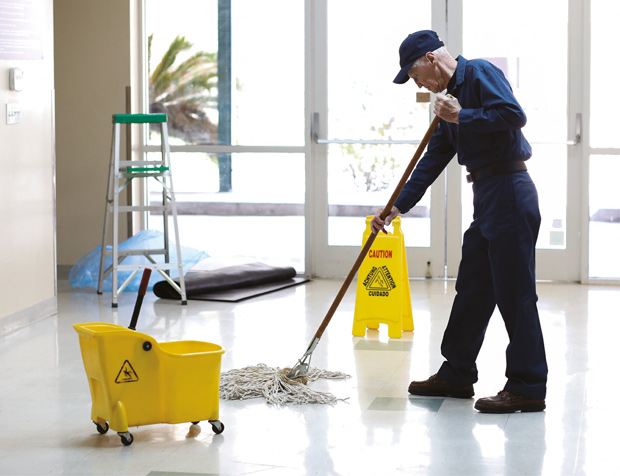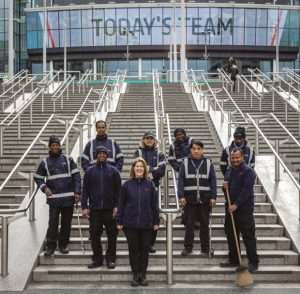 Supporting an ageing workforce through innovation. By Lucy Lloyd, Chief Services Officer at Kingdom Cleaning
Supporting an ageing workforce through innovation. By Lucy Lloyd, Chief Services Officer at Kingdom Cleaning
The cleaning industry is a top 10 employment industry in the UK. According to the British Cleaning Council (BCC), the cleaning, hygiene and waste industry directly employs over 1,006,400 staff, a 1.25 per cent increase from the previous year. If occupations involved in cleaning across other industries such as public services and hospitality are included, the total number of individuals working in the industry can be expressed as 1.47 million. This equates to approximately five per cent of the UK workforce.
The cleaning industry plays a crucial but often overlooked role in keeping the UK running. It is essential to ensuring public services run safely and it is vital to the health and wellbeing of the country. Cleaning as a profession is one that will always be required, yet it is also one with an ageing workforce. I believe the answer lies in innovation. This isn’t just about getting the job done more efficiently but about better supporting the people doing it.
DEMOGRAPHIC CHALLENGES
There are several demographic challenges within the sector that the industry needs to adapt to, not least we have an ageing workforce and fewer younger people choosing to enter the profession.
Figures from the BCC show that the proportion of staff under 25 in the industry is lower than seen across all the economy, (nine v 11 per cent). In contrast, the proportion of staff aged over 55 (27 per cent) is higher (21 per cent) suggesting that that the sector may face issues around an ageing workforce.
With over a quarter of cleaning staff being over the age of 55, and under 25’s making up just nine per cent of the cleaning workforce, this could lead to a shortage of cleaning staff in the future.
This age discrepancy often arises in sectors that haven’t focused on attracting younger workers – and while individual businesses do what they can, the cleaning industry needs to shift towards being viewed as a more exciting one for younger generations to join.
Currently, the smaller proportion of younger workers could be due to perceptions of the role of a cleaner, a perceived lack of progression or the general shift among younger people wanting more office or home-based roles as opposed to physically demanding jobs. Many jobs that existed for hundreds of years – builders, cleaners, farmers, carers – are not as popular amongst younger generations as they once were, however these roles are crucial to keeping the economy running.
DUAL CHALLENGE
The imbalance creates a dual challenge; retaining experienced workers while making the profession more attractive to younger people who will make up the workforce in the future. This means the industry needs to go beyond surface-level incentives and instead offer impactful and sustainable improvements that will support the health and wellbeing of staff.
Technical innovation plays an important part and something that we have introduced is the use of cobotics, or collaborative robotics to help support our staff. These machines can take on repetitive and more physically demanding tasks, allowing staff to stay focused on more skilled or customer facing elements of the role. These devices also help staff conserve energy, reduce their fatigue and is a great example of how technology isn’t dehumanising the sector, but is instead making it more humane.
HEALTH AND WELLBEING
Alongside this, at Kingdom Cleaning, we look after the health of staff through smaller innovations. We supply our staff with specially designed biomechanic footwear that improves posture and reduces strain. These shoes can make a real difference to people who spend hours on their feet every day, particularly older staff. It might be innovation that is viewed as a ‘nice to have’ for some companies, but for us, the wellbeing of our staff is crucial. This simple change is proven to help reduce injury and risks of slips and falls, which likewise improves staff retention and boosts morale.
Innovation and the use of technology to improve health and wellbeing is also an important element in helping to change how the industry is perceived, particularly among younger job seekers.
Cleaning roles are too often seen as low-skilled, however, innovations and the introduction of ergonomic tools to the role, alongside a culture that values health, will help to ensure that the industry is seen increasingly for what it is: forward-thinking and people-focused. This can support the long-term recruitment into the cleaning industry and help bridge the generational divide in the workforce.
According to the BCC the number of foreign-born people working in the cleaning industry accounts for 21 per cent of the workforce. This is greater than all sector figure where 18 per cent of the workforce are foreign born.
This brings more of a challenge in training and upskilling workers for whom English is not their first language. At Kingdom Cleaning, we assist new starters if they are not proficient in English with filling out forms. Within the wider industry, a good option could be to introduce literacy or digital literacy programmes to improve accessibility and opportunity for workers wanting to advance their skills as well as keep up with how the industry is innovating to improve efficiency.
The importance of investing in people cannot be understated. It’s vital that innovation is viewed as a path to efficiency in the sector, but also as part of a long-term strategy for workforce sustainability. Others in the sector should also be following suit, using innovation as a force for good in a sector that undoubtedly touches every corner of society.






